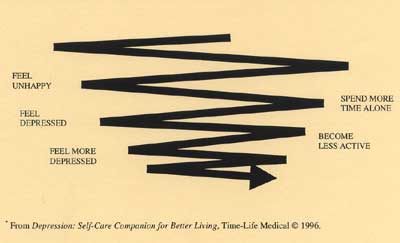Mood Management
Depression affects the whole person including physical well being, thoughts, and feelings. People who suffer from other medical illnesses such as head and neck cancer, are more likely to have symptoms of depression
Depression, sometimes called "clinical depression", is a medical illness. People experience it differently, but it usually goes beyond feeling down, blue, or sad. Depression affects the whole person including physical well being, thoughts, and feelings. People who suffer from other medical illnesses such as head and neck cancer, are more likely to have symptoms of depression.
Depression affects 10 million American men and women each year. Studies show that up to 20% of people will experience depression at some point in their life. Depression is more common than cancer, lung disease, or diabetes.
As depression has become more widely discussed, more people have come forward to share their experiences. Mike Wallace, a reporter on the TV program, 60 Minutes, former First Lady Barbara Bush and author Kurt Vonnegut are just a few people who have struggled with depression and have shared their experiences with the public.
"I didn't know what was the matter with me. All I knew was that I was feeling lower than a snake's belly. I had pains in my arms and a kind of weakness in my legs. I had no memory, no powers of concentration."
--Mike Wallace, On the Edge of Darkness
What are the symptoms of depression?
Depression can be felt differently by each person who experiences it. Some people experience more physical symptoms, others report more psychological symptoms, and others have a combination of physical and mental symptom. Some symptoms of depression are:
- Difficulty sleeping, early waking, or sleeping too much
- Feeling sad
- Body aches and pains
- Worrying excessively about your health
- Spending a lot of time alone
- Not wanting to socialize or being less social
- Loss of interest in activities normally important to you
- Difficulty concentrating
- Eating more or less than you normally do
- Feeling hopeless
- Losing interest in sex
- Having more negative than positive thoughts
- Anxiety or panic attacks, nervousness, or tension
- Inferiority or feeling that you are less important than others
- Loneliness
- Difficulty making up your mind or making decisions
- Persistently feeling down, blue, tearful, or irritable
- Feeling fatigued, slowed down or lacking energy
- Thinking about death or suicide
- Feeling helpless, worthless, or guilty
- Feeling pessimistic or hopeless
Some people can pinpoint a single trigger event that causes their depression, while others become depressed for no apparent reason. It is not the depressed person's fault that he or she is depressed, nor is it a weakness. Depression may be an inherited condition for some people, they have close relatives who also have suffered from depression.

Chemical changes in the brain can be responsible for depression. Stress may trigger chemical changes in some people. Researchers are continuing to discover more about why chemical changes occur and how they contribute to symptoms of depression. One reason depression can become such a serious illness is that it usually feeds on itself, resulting in a negative spiral.
For some people the negative spiral of depression begins with a stressful event, difficulty with a medical illness, or a change in lifestyle, such as a move or retirement. For a small number of people, depression is caused by another illness or is a side effect from a medication. A complete check-up and review of medications by a doctor/nurse will help determine if any of these factors are contributing to your depression.
A depression inventory form (PDF format, 14k) is available to assist you in evaluating if you have symptoms of depression and the severity of those symptoms.
